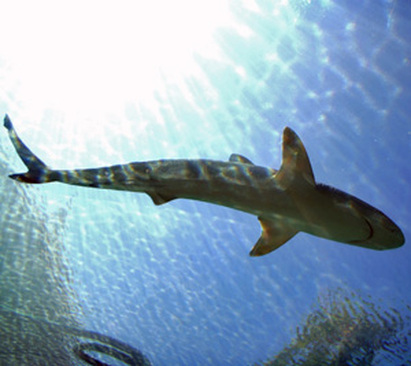Author: No authors were given: Made by the Census of Marine Life
Chapter 3: Matter, Energy, and Life Video Clip: https://www.youtube.com/watch?v=yzlqXMateRE Content of the Article: http://www.coml.org/discoveries/trends/shark_decline_effects What Was The Article About? Sharks, [apex] predators at the top of the food chain, keep populations of other fish in healthy and proper proportions within their ecosystems, yet they are decreasing in population numbers due to human hunting. Sharks are being killed for their fins to make shark fin soup, which is not an important part for human survival or health. Instead, the decreasing number in shark population, has negatively affected the lower trophic levels of the marine ecosystems; populations of prey species have been outpaced to replenish its own stock. Other species of predators that the sharks would normally eat are increasing in number and overeating prey populations. For example, an increase in the cownose rays in the Mid-Atlantic seacoast of the United States (due to the decrease in the shark population that prey on cownose rays) has resulted in a decreased bay scallop population (cownose rays prey on scallops). If the ecosystem does not return to normal, the negative effects caused by the over hunting sharks, will extend to other commercially important organisms like oysters and clams. Reflection The problem in the article is the over hunting of sharks by humans, the players, to make shark fin soup and other commodities. The marine ecosystems and the animals living in it are the ones being negatively affected because the lack of sharks is allowing the mesopredator population to increase and in turn, is reducing the populations of lower level prey species. The solutions to this problem are to limit human interference and allow healthy numbers of sharks to swim in the oceans or to balance the hunting numbers; sharks should be hunted but only if a variety of other predator and prey species are being hunted in equal amounts. The governments of the countries should pass laws restricting the hunting of sharks and start shark conservation efforts to maintain a stable shark population. The way I feel towards the article is that it was very informative in explaining how important the shark species is to the whole functioning of the ecosystem; the article showed the negative impacts human intervention can have in ecosystems where sharks are being over-hunted. It showed me that exploiting sharks for unnecessary things is wrong and should be stopped as soon as possible. The article relates to AP Environmental Science because in chapter 3, the relationship between species of consumers with other species of consumers was explained to be linked to a food chain; each time an organism feeds, it becomes a link in a food chain, which become interconnected when predators feed on more than one kind of prey, forming a food web, in the same way the article demonstrated how the sharks are connected to the life of other species (that also may be connected to other species) that are important in maintaining an ecosystem. The importance of a balance in nature was emphasized and the consequences of disobeying and interfering with natural ecosystems were shown to have been negative to not just one, but many species in a food web. I learned that the disturbance of a single species of organism in an ecosystem can not only affect another or few species, but affects a variety, if not all, of the organisms living in an ecosystem and without all of the ''components'' needed for a food web to properly function, the ecosystems will fail and may cause the disappearance of numerous species (i.e. the low population of sharks increases the population of cownose rays and the cownose rays begin overeating animals in the lower levels of a food web to the point where the species cannot reproduce fast enough, resulting in their extinction).
0 Comments
|

 RSS Feed
RSS Feed